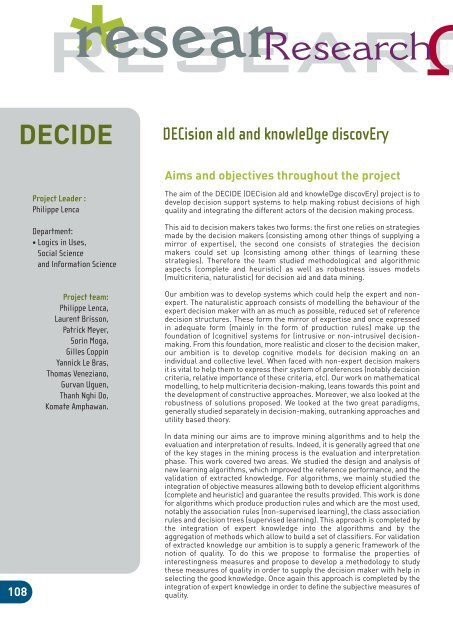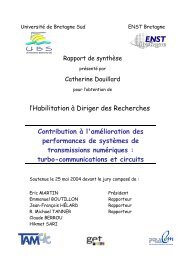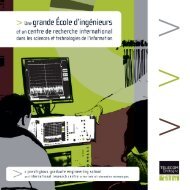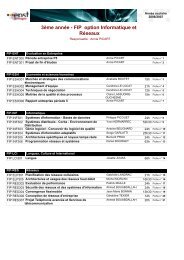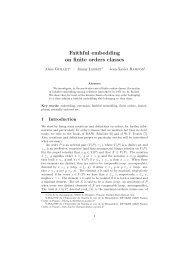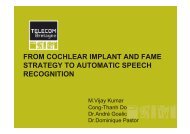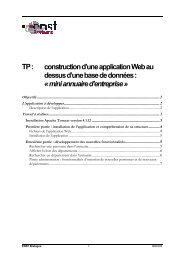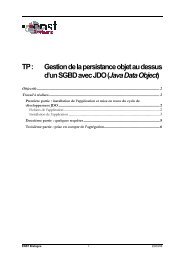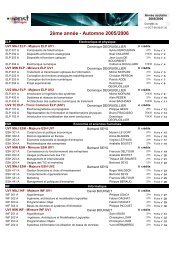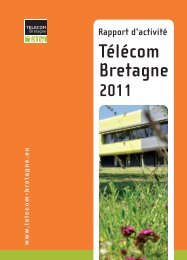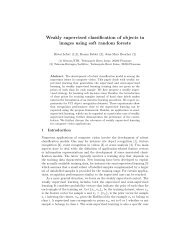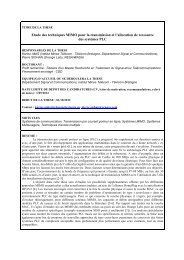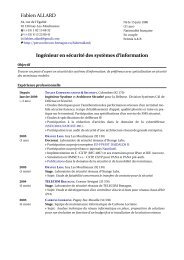researResearch - Télécom Bretagne
researResearch - Télécom Bretagne
researResearch - Télécom Bretagne
Create successful ePaper yourself
Turn your PDF publications into a flip-book with our unique Google optimized e-Paper software.
esearc<br />
<strong>researResearch</strong><br />
DECIDE<br />
DECision aId and knowleDge discovEry<br />
Aims and objectives throughout the project<br />
Project Leader :<br />
Philippe Lenca<br />
Department:<br />
• Logics in Uses,<br />
Social Science<br />
and Information Science<br />
Project team:<br />
Philippe Lenca,<br />
Laurent Brisson,<br />
Patrick Meyer,<br />
Sorin Moga,<br />
Gilles Coppin<br />
Yannick Le Bras,<br />
Thomas Veneziano,<br />
Gurvan Uguen,<br />
Thanh Nghi Do,<br />
Komate Amphawan.<br />
The aim of the DECIDE (DECision aId and knowleDge discovEry) project is to<br />
develop decision support systems to help making robust decisions of high<br />
quality and integrating the different actors of the decision making process.<br />
This aid to decision makers takes two forms: the first one relies on strategies<br />
made by the decision makers (consisting among other things of supplying a<br />
mirror of expertise), the second one consists of strategies the decision<br />
makers could set up (consisting among other things of learning these<br />
strategies). Therefore the team studied methodological and algorithmic<br />
aspects (complete and heuristic) as well as robustness issues models<br />
(multicriteria, naturalistic) for decision aid and data mining.<br />
Our ambition was to develop systems which could help the expert and nonexpert.<br />
The naturalistic approach consists of modelling the behaviour of the<br />
expert decision maker with an as much as possible, reduced set of reference<br />
decision structures. These form the mirror of expertise and once expressed<br />
in adequate form (mainly in the form of production rules) make up the<br />
foundation of (cognitive) systems for (intrusive or non-intrusive) decisionmaking.<br />
From this foundation, more realistic and closer to the decision maker,<br />
our ambition is to develop cognitive models for decision making on an<br />
individual and collective level. When faced with non-expert decision makers<br />
it is vital to help them to express their system of preferences (notably decision<br />
criteria, relative importance of these criteria, etc). Our work on mathematical<br />
modelling, to help multicriteria decision-making, leans towards this point and<br />
the development of constructive approaches. Moreover, we also looked at the<br />
robustness of solutions proposed. We looked at the two great paradigms,<br />
generally studied separately in decision-making, outranking approaches and<br />
utility based theory.<br />
108<br />
In data mining our aims are to improve mining algorithms and to help the<br />
evaluation and interpretation of results. Indeed, it is generally agreed that one<br />
of the key stages in the mining process is the evaluation and interpretation<br />
phase. This work covered two areas. We studied the design and analysis of<br />
new learning algorithms, which improved the reference performance, and the<br />
validation of extracted knowledge. For algorithms, we mainly studied the<br />
integration of objective measures allowing both to develop efficient algorithms<br />
(complete and heuristic) and guarantee the results provided. This work is done<br />
for algorithms which produce production rules and which are the most used,<br />
notably the association rules (non-supervised learning), the class association<br />
rules and decision trees (supervised learning). This approach is completed by<br />
the integration of expert knowledge into the algorithms and by the<br />
aggregation of methods which allow to build a set of classifiers. For validation<br />
of extracted knowledge our ambition is to supply a generic framework of the<br />
notion of quality. To do this we propose to formalise the properties of<br />
interestingness measures and propose to develop a methodology to study<br />
these measures of quality in order to supply the decision maker with help in<br />
selecting the good knowledge. Once again this approach is completed by the<br />
integration of expert knowledge in order to define the subjective measures of<br />
quality.


